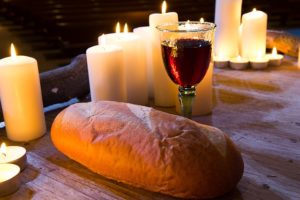The Last Supper and Our Daily Work
While they were eating, Jesus took bread, and when he had given thanks, he broke it and gave it to his disciples, saying, “Take it; this is my body.” Then he took a cup, and when he had given thanks, he gave it to them, and they all drank from it.
Mark 14:22-23
 Today, as we make our way devotionally through the Gospel of Mark, we come to the Last Supper, the Passover meal that Jesus shared with his disciples on the night before his crucifixion. As I read Mark 14:22-23, I am struck once again by something I didn’t see for the first five decades of my life. It’s something I’ve mentioned before in these Life for Leaders devotions. It’s something that is both obvious and usually overlooked. Thus, I want to reflect on it once again.
Today, as we make our way devotionally through the Gospel of Mark, we come to the Last Supper, the Passover meal that Jesus shared with his disciples on the night before his crucifixion. As I read Mark 14:22-23, I am struck once again by something I didn’t see for the first five decades of my life. It’s something I’ve mentioned before in these Life for Leaders devotions. It’s something that is both obvious and usually overlooked. Thus, I want to reflect on it once again.
I’m talking about the fact that Jesus used the products of work to signify himself and his pending death. Bread doesn’t just happen. Nor does wine. Bread requires a sower and a reaper. Somebody had to take the harvested wheat and grind it into flour. Then, someone took this flour and made bread. The wine was also a product of human labor, based, of course, on the natural process of grapes growing on vines. Someone needed to harvest the grapes and go through the laborious process of turning them into wine. The wine was served in a cup, which was probably formed out of clay by a potter.
So, the elements Jesus chose to point to his imminent sacrifice were the products of human work. Jesus could have chosen ideas, sounds, words, or images to enrich our understanding and experience of his death on the cross. But, instead, he chose that which existed through a partnership between nature and our labor, not wheat stalks and grape bunches, but bread and wine.
What does this suggest about the value of our work? In the Theology of Work commentary on the Lord’s Supper in Matthew 26 we read, “We cannot pretend to know why Jesus chose tangible products of human labor to represent himself rather than natural articles or abstract ideas or images of his own design. But the fact is that he did dignify these products of work as the representation of his own infinite dignity. When we remember that in his resurrection he also bears a physical body (Matt. 28:9, 13), there can be no room to imagine the kingdom of God as a spiritual realm divorced from the physical reality of God’s creation. After creating us (Genesis 2:7; John 1), he chose articles of our handiwork to represent himself. This is a grace almost beyond comprehension.”
Even in the Last Supper we are reminded of the dignity and value of human work. Yet, we mustn’t turn the products of our work into idols. Nor should we believe that all work is necessary good. Remember that the Last Supper points to the sacrifice of Jesus on a Roman cross. The cross was also a product of human labor. And those who nailed Jesus to the cross were also simply doing their job as Roman soldiers.
As I reflect on the Last Supper, I want to do good work, work that honors the Lord. Moreover, I want my work to have a sacramental quality. I want it to represent Jesus in this world. I want my work to be an expression of his call upon my life and my obedient and grateful response. I expect you do too. And your work can have this sacramental quality; no matter what good work you do, if you do it for God’s purposes and glory, giving thanks as you work.
QUESTIONS TO CONSIDER:
As you think about the fact that Jesus used products of work to represent himself and his sacrifice, what occurs to you? What does this truth evoke in you?
Do you think of your daily work as something valued by the Lord? Why or why not?
In what way might your work be a representation of Jesus?
PRAYER:
Gracious Lord Jesus, thank you for choosing to die on the cross for us, and our salvation. And thank you for giving us in your Supper a powerful representation and experience of your death for us.
Moreover, thank you for choosing the products of work to represent your body and blood. This choice reminds us that work matters, even work we consider rather ordinary. Help us, Lord, to see our work as you see it. Help us to offer all of our work to you, and to serve you through our work.
All glory, honor, and praise be to you, Lord Jesus. Amen.
Explore more at the Theology of Work Project online Bible commentary: The Cross and Resurrection (Mark 14:32-16:8)

Mark D. Roberts
Senior Fellow
Dr. Mark D. Roberts is a Senior Fellow for Fuller’s Max De Pree Center for Leadership, where he focuses on the spiritual development and thriving of leaders. He is the principal writer of the daily devotional, Life for Leaders, and t...


